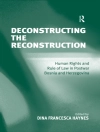The Emergence of Modern Jewish Politics examines the political, social, and cultural dimensions of Zionism and Bundism, the two major political movements among East European Jews during the first half of the twentieth century.While Zionism achieved its primary aim—the founding of a Jewish state—the Jewish Labor Bund has not only practically disappeared, but its ideals of socialism and secular Jewishness based in the diaspora seem to have failed. Yet, as Zvi Gitelman and the various contributors to this volume argue, it was the Bund that more profoundly changed the structure of Jewish society, politics, and culture.In thirteen essays, prominent historians, political scientists, and professors of literature discuss the cultural and political contexts of these movements, their impact on Jewish life, and the reasons for the Bund’s demise, and they question whether ethnic minorities are best served by highly ideological or solidly pragmatic movements.
लेखक के बारे में
Zvi Gitelman, professor of political science and Preston R. Tisch Professor of Judaic Studies at the University of Michigan, is the author of A Century of Ambivalence: The Jews of Russia and the Soviet Union, 1881 to the Present.












